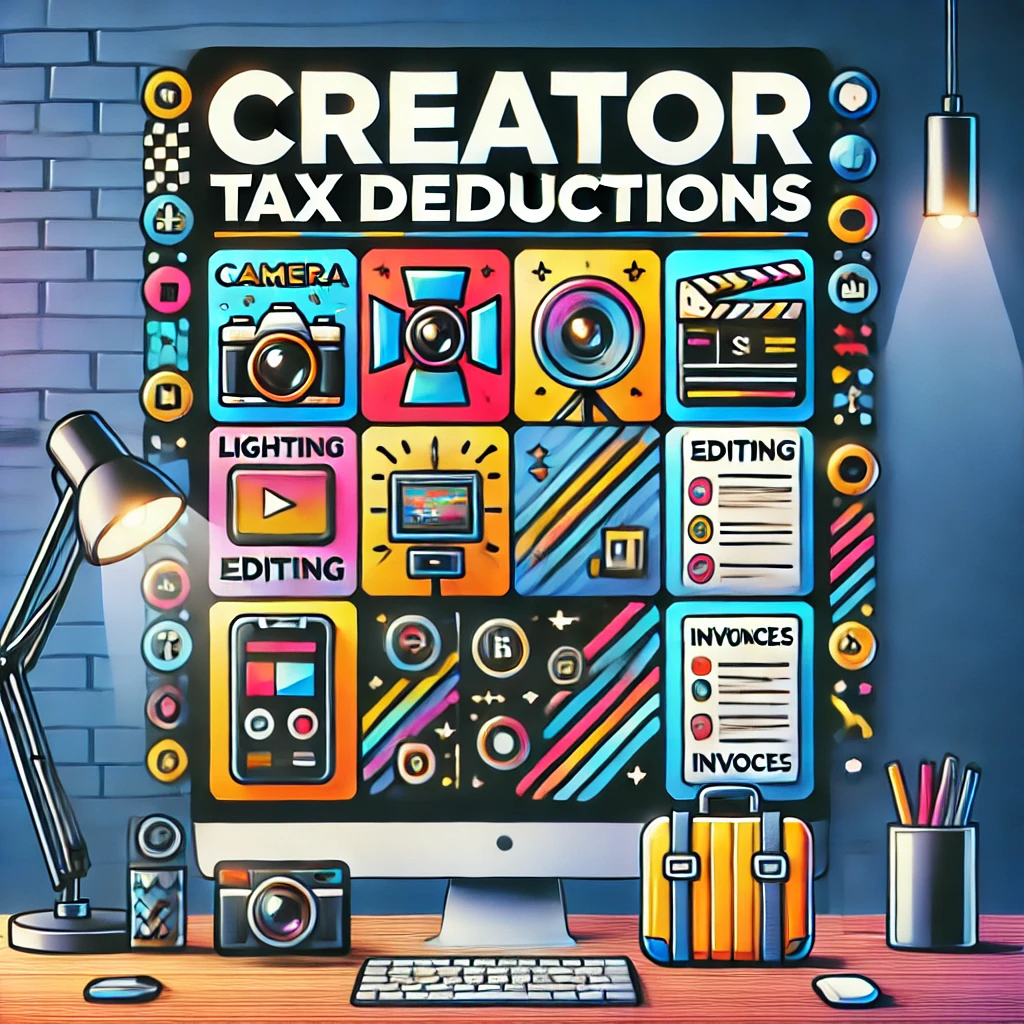Transform Your Financial Game: Bookkeeping Strategies for Successful Content Creators
Bookkeeping for content creators doesn’t have to be overwhelming. If you’re earning good money from YouTube, Twitch, Patreon, or sponsorships — congrats, you’re running a business. Now it’s time to treat it like one.
However, that means more than tracking tax write-offs once a year or dumping receipts into a shoebox.
Done right, bookkeeping can help you save money, make smarter business decisions, and actually enjoy tax season (well… maybe just a little).
Let’s walk through exactly what bookkeeping looks like for content creators like you — without the accounting jargon.
Why Creators Need to Treat Their Income Like a Business
If you’re pulling in five or six figures from content, brand deals, or subscriptions, the IRS sees you as a business. Even if it still feels like a creative side hustle, financially? It’s real.
Whether you’re just setting up an LLC or you’ve elected S-Corp, there are rules you have to follow — and smart strategies that’ll make your life way easier.
Do You Need to Track Patreon or YouTube Income?
Short answer: yep. Those Twitch tips, YouTube payouts, and Patreon subs? They’re income. The IRS doesn’t care if they came in as a $3 coffee or a $3,000 payout. They expect you to report it all.
On top of just making the IRS happy, good bookkeeping helps you:
- Know exactly how much you’re making (not just what hits your bank after fees)
- Save for taxes automatically
- Make better decisions based on accurate information
Bookkeeping for Content Creators: What It Actually Looks Like
So, what does bookkeeping actually involve for someone like you?
Let’s break it down.

Your Income Streams
Most creators have multiple sources:
- Twitch bits, donations, and payouts
- YouTube ad revenue + Super Chats
- Patreon memberships
- Affiliate commissions
- Sponsored content
- Brand partnerships
- Online courses or merch
That’s a lot to track. And not all of it flows neatly through one platform or bank account.
Your Toolkit: Spreadsheets, QuickBooks, & More
You can start simple:
- Spreadsheets: Great if you’re tracking 1-2 income streams
- QuickBooks: Best for growing creators with multiple platforms
Whatever you do, just don’t rely on PayPal or Venmo transaction history alone — they’re messy, inconsistent, and don’t give you the clarity you need.
Hybrid Cash/Accrual: Real World > Textbook
We generally use a hybrid method — recognizing income when it hits your account (cash) and tracking key expenses or invoices as they happen (accrual).
Why? Because you’re not a Fortune 500 company. You’re a business owner who needs useful info, not investor reports.
What You Can Deduct (and What You Can’t)
When it’s done right, your bookkeeping unlocks way more deductions than you’d expect.

Legit Write-Offs for Creators
- Cameras, mics, lights, SD cards
- Editing software and apps
- Subscriptions like Epidemic Sound or Adobe CC
- Home office percentage (based on square footage)
- Internet (yes, a portion is deductible)
- Travel for events or collaborations
- Outsourced help: virtual assistants, editors, designers
Don’t Miss This: Your Fiverr Editor’s Invoice Counts
Hiring an editor? Social media manager? Script writer? That’s a business expense. Record it. Deduct it. Boom — less taxable income.
The Rule: If It Helps You Make Money, Track It
Even things like gaming consoles, music licensing, or TikTok tools could count. But you need solid records and a team to support you — hence, bookkeeping.
Should You DIY or Hire a Bookkeeper for Creators?
If you’re making over $100K or your income comes from multiple platforms, the DIY game gets dicey fast.
DIY: Pros & Cons
✅ Cheaper short-term
❌ Time-consuming
❌ Easy to miss deductions
❌ Stressful come tax time
When to Bring in a Bookkeeper (Especially for S-Corp Creators)
If you’ve elected S-Corp (or are considering it), it’s probably time. S-Corps have extra requirements — like reasonable payroll, monthly reconciliations, and quarterly filings.
A niche bookkeeper who gets creators can help with:
- Organizing income by platform
- Prepping clean books for your tax pro
- Making sure you pay yourself the right way
- Catching red flags before the IRS does
3 Simple Steps to Start Bookkeeping Like a Pro
1. Open a Business Bank Account
Set up a dedicated business account to keep income and expenses completely separate.
This one small move will make your tax season a whole lot easier.
Bonus: your future self (and your CPA) will be grateful.
2. Pick a System That Works for You
Start with a spreadsheet, but if you’re growing, move to QuickBooks or another software that integrates with your platforms, bank accounts, and credit cards.
3. Review Monthly, Not Yearly
Set a calendar reminder. Review your income, categorize your expenses, and move money to a tax savings account. Every. Single. Month.
Bookkeeping as a Creator = Business Confidence
You don’t have to be an accounting expert. But with clean books, you can:
- Budget for new gear or hires
- Plan your next launch or merch drop
- Set aside taxes and sleep easy
- Actually know what you made last month
No more “I think I made $20K” moments. You’ll know.
Frequently Asked Questions (FAQ)
1. Do I have to report Twitch donations?
Yes, if you’re receiving regular income on Twitch, it’s considered taxable — even donations or bits.
2. What's the best bookkeeping software for creators?
QuickBooks is a solid choice and, generally, we recommend our clients use QuickBooks Online. In addition to being a Certified Public Accountant, our Founder, Ryan, is also a QuickBooks ProAdvisor. Check out his ProAdvisor profile.
No accounting software is perfect though. It’s worth doing your research to make sure you choose the best one for your situation.
If you’re looking to DIY at first there are also a few free software options available.
3. Can I deduct my home office if I also stream from it?
Absolutely — if it’s a dedicated space used regularly and exclusively for work.
4. Should I track income from affiliate links?
Yes! It’s income. And it adds up faster than you think.
5. What’s the difference between LLC and S-Corp bookkeeping?
S-Corps need more structure: payroll, quarterly reports, and formal books. LLCs are simpler but still require clean tracking.
6. How do I pay myself as a creator with an S-Corp?
You’ll need to run payroll (typically through a provider like Gusto or QuickBooks Payroll) and also track distributions. A bookkeeper helps make this seamless.
Ready to Ditch the Stress? Let’s Level Up Your Finances
Bookkeeping can be simple to setup, but it ain’t easy to keep up-to-date. With the right systems and support though, it can show you things you never knew about your business.
If you’re a creator ready to ditch the financial fog and actually feel on top of your business, let’s talk.
Check out our bookkeeping services for content creators – trusted by full-time YouTubers, streamers, and creative entrepreneurs across the U.S. We’ll handle the numbers so you can stay in your creative zone.








